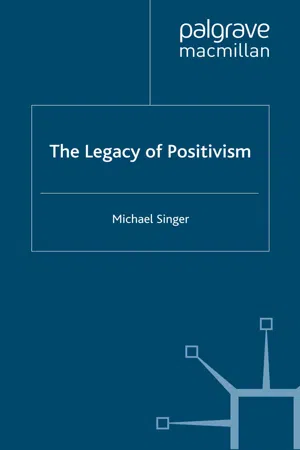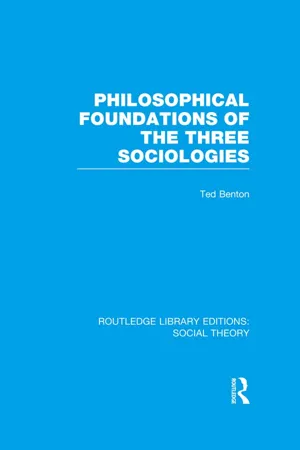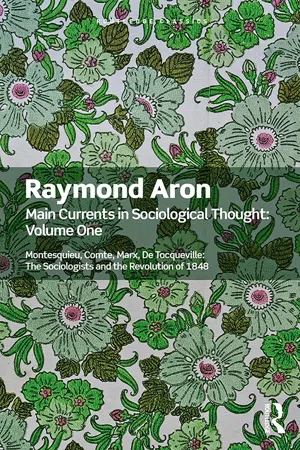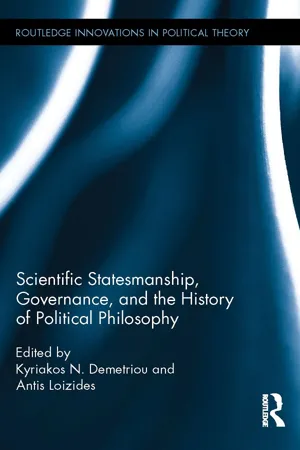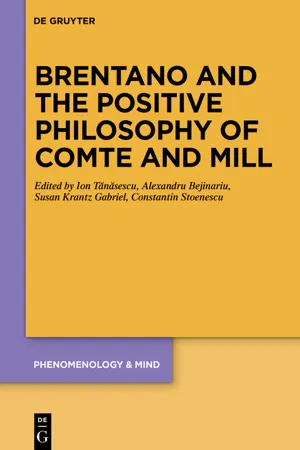Social Sciences
Auguste Comte
Auguste Comte was a French philosopher and sociologist known for coining the term "sociology" and for his development of positivism. He emphasized the scientific study of society and the application of scientific methods to social phenomena. Comte's work laid the foundation for the discipline of sociology and contributed to the understanding of social order and change.
Written by Perlego with AI-assistance
Related key terms
1 of 5
12 Key excerpts on "Auguste Comte"
- eBook - PDF
- Michael Singer(Author)
- 2005(Publication Date)
- Palgrave Macmillan(Publisher)
Part I The Positivism of Auguste Comte 1 The Philosophy of Positivism 3 i. Comte and his works In 1822, Auguste Comte, then twenty-four years of age, published a plan for the total intellectual, social and political reorganization of society. 1 He had studied mathematics at the École Polytechnique in Paris, and had read widely in the sciences and in French political philosophy of the eighteenth century. He was to devote his life to his work on the doc- trines that became known as positivism, continuing until shortly before his death in 1857. In the extensive Cours de Philosophie positive, pub- lished mainly in the 1830s, he developed positivism as a combined philosophical and socio-political structure. The philosophical aspects of the structure consisted of purportedly descriptive theories of human knowledge and society. The socio-political aspects were prefigured in the early work referred to above, and following their adumbration in the Philosophie positive they were fully developed in the later Système de politique positive. These aspects were explicitly normative, and directed towards the goal of systematically implementing his philosophical the- ories as the modes of thought and action of human society. Comte’s later works further developed positivism as an explicitly religious frame- work – the so-called religion of humanity – for the propagation and social implementation of the positivist philosophical and political structure. In so far as it is feasible to separate these philosophical, socio- political and religious aspects of Comte’s work, it may be said that the philosophical aspects captured the spirit of many of the most notable thinkers of the times and brought Comte great acclaim. They were later subjected to considerable criticism but nonetheless have been widely influential to an extent that is often not clearly recognized. However, S. Michael, The Legacy of Positivism © Michael Singer 2005 - Ted Benton(Author)
- 2014(Publication Date)
- Routledge(Publisher)
2 Auguste Comte and positivist sociology Ted Benton DOI: 10.4324/9781315763484-2Central to this chapter will be a consideration of that conception of the nature of scientific sociology which has had the greatest influence both on the practice of social scientists and on their conceptions of what they do. This is the positivist philosophy – or ‘positivism’ – usually associated with the name of Auguste Comte. I have already said a little about the positivist conception of the relationship between philosophy and the social sciences, and in this chapter I propose to discuss the leading doctrines of the positivist philosophy, as expounded by Comte himself. But Comte's positivism was not a closed and finally elaborated system of ideas. On the contrary, it and its relatives have been subjected to a continuous process of revision, development and sophistication up to the present day, and so I shall devote part of my third and fourth chapters to giving some account of these latter-day developments before advancing the more fundamental criticisms of positivist doctrine.Although Comte coined the term ‘positivisme’, he was by no means a profoundly original thinker, either in philosophy or sociology, and it will be necessary to approach his work through a prior discussion of the philosophical tradition to which he belonged, and the traditions of social thought which informed his work. It is also necessary, if Comte's particular combination of philosophical and social thought is to be understood, to speak a little of the economic and political situation in the France of the early nineteenth century.Epistemology
The aspect of Comte's philosophy with which I shall be centrally concerned is his contribution to ‘epistemology’, or the philosophical theory of knowledge. The principal questions of epistemology, as I mentioned in chapter 1- eBook - ePub
Philosophic Classics, Volume IV
Nineteenth-Century Philosophy
- Forrest Baird(Author)
- 2023(Publication Date)
- Routledge(Publisher)
Comte calls on thinkers to move beyond both stages and to develop a truly “positive” philosophy based entirely on “observed facts.” Comte points out that in the field of astronomy, movement from theological to metaphysical to positivistic explanation had long since taken place. Physics, chemistry, and physiology had, for the most part, also moved through the three stages. Yet in the realm of social phenomena, humankind had not yet moved to positive explanation. Comte argues that only by using positive philosophy to study the human mind and social interactions could there be real social progress. No longer would society be built on the sand of beliefs, but on the rock of facts. Society’s problems can never be solved by theological or metaphysical methods. Instead, Comte proposes to “complete the vast intellectual operation commenced by Bacon, Descartes, and Galileo, by furnishing the positive philosophy with the system of general ideas that is destined to prevail henceforth, and for an indefinite future, among the human race. The revolutionary crisis which harasses civilized peoples will then be at an end.”Critics of Comte have been legion. Some have argued that Comte has a mistaken or inconsistent conception of the scientific process. (For example, on the one hand, he acknowledges that science must constantly redeFLne its “laws,” yet he seems to treat these laws as fixed and stable when applied to society.) Others have argued that his approach leaves little room for ethics, while making several illegitimate ethical assumptions. Still others have charged him with errors of fact and have claimed that his anti-Protestant sentiment colored his research. Yet it would be difficult to overstate the importance of this relatively unknown man. Comte is generally acknowledged as the founder of sociology. In addition, his positivism has had followers in every subsequent generation. In this century, for example, the Logical Positivists applied Comte’s insights to the study of language. Comte’s rejection of metaphysics, his historical understanding of the development of human reason, his denial of traditional religious beliefs, and even, in a modified form, his Religion of Humanity have all had proponents over the years. And echoes of his writings are heard in many contemporary philosophical debates. - eBook - PDF
- George Ritzer, Barry Smart, George Ritzer, Barry Smart(Authors)
- 2001(Publication Date)
- SAGE Publications Ltd(Publisher)
3 The positive philosophy of Auguste Comte In 1822, Auguste Comte published the first clear statement of his positive philosophy in an article titled ‘Plan of the Scientific Operations Neces-sary for Reorganizing Society’. For Comte, it was essential to create a ‘positive science’ like other sciences, and this science would be based upon empirical observations that would be used to generate and test abstract laws of human organization. This new science was to be called ‘social physics’ 4 and once the laws of human organization have been discovered and formu-lated, they should be used to direct the operation of society. Scientists of society were, therefore, to guide the course and direction of human organization. One of the most fundamental laws of human organization was the ‘law of the three stages’ – an idea which he clearly borrowed from Turgot, Condorcet and Saint-Simon – with each stage being typified by a particular kind of ‘spirit’ – a notion that first appeared in Montesquieu’s The Spirit and was reinforced by Condorcet and Saint-Simon. These well-known stages were the ‘theological-military’, ‘metaphysical-judicial’, and ‘scientific-industrial’ or positivistic. Society had now entered the last stage, and hence, it was possible to have a true science of social organization. For Comte, the age of sociology had arrived; and it was to be very much like Newtonian physics in the formulation of abstract laws on the forces of THE ORIGINS OF POSITIVISM 31 the social universe that could then be used to reconstruct society. This first important essay, written independently of Saint-Simon, presented in broad strokes the outline of Comte’s more ambitious Course of Positive Philosophy . The Course of Positive Philosophy is a long work; and its goal was to unify all of the sciences, while advocating a place for sociology among the sciences. - eBook - PDF
- Edward A. Purcell(Author)
- 2003(Publication Date)
- Yale University Press(Publisher)
IO The Basic Principles ofAuguste Comte's Sociological Doctrine A. S. L A P P O -D A N I L E V S K I I Introduction In the course of the first decades of the nineteenth century, enthusiasm for the scientific spirit was perhaps nowhere as strong as in France: there science was enriched by a number of new fields of knowledge and acquired great popularity. At the same time, however, French society during the Resto-ration began to react against the excesses of individualism and revealed a clear inclination for the establishment of some type of spiritual authority. Such an attitude was felt not only by reactionaries, but also by progressive people, who believed that the time had arrived for the reorganization 1 of the social order. They included, for example, the ardent admirer of science and bold precursor of socialism, Saint-Simon; 2 not able to focus his lively mind, he did not, how-ever, create anything whole and finished his versatile literary activity with his famous discourse on the principles of a new Christianity. 3 Auguste Comte, an associate of Saint-Simon for a time, 4 must be recognized as a much more systematic representative of the new attitude. A profound faith in the all-encompassing significance of science and a strong desire for the moral renewal of society permeate all Comte's philosophy: his Cours de philosophie positive vividly reflects the basic currents dominant in French thought since the second half of the eighteenth century, and represents one of the first attempts to 356 Comte's Sociological Doctrine 357 construct a logic of the individual sciences. And his Systeme de politique positive resounds with the convinced voice of someone calling people to fulfill their moral duty, of someone proclaiming a religion of humanity. - eBook - PDF
Classical Theorists in the Social Scienc
From Western Ideas to African Realities
- Dejo Abdulrahman(Author)
- 2023(Publication Date)
- Malthouse Press(Publisher)
Like an eye opener, these books were used to illustrate and expose how empirical studies could be used, to reshape human organizations, movement and activities (Comte, 1875). According to Comte, who was as well, influenced by both Saint-Simon’s (1760) and Montesquieu’s (1689-1755) perceptions on laws of society; there was an urgent need for a positive science of society (social physics), in which human organization and movement of the society could be empirically examined and determined. In fact, as early as 1822, while August Comte was still serving under Saint Simon, he set for himself the assignment to discover the law of human progress, which emerged from his ambition to apply what he conceived to be a method of scientific comparison (Salawu & Muhammed, 2007). Since the goal of every science was to observe phenomena and explain the relationships between cause and effect, through some natural laws and theories, it was therefore believed by Comte that sociology must embrace similar ideology, where discovery of social order and change could be determined by some natural The Birth of Sociology – from Auguste Comte to Herbert Spencer 139 laws and guided by theories; in such a way that clear explanations could be used to monitor the course and direction of human organization. - eBook - ePub
Main Currents in Sociological Thought: Volume One
Montesquieu, Comte, Marx, De Tocqueville: The Sociologists and the Revolution of 1848
- Raymond Aron(Author)
- 2018(Publication Date)
- Routledge(Publisher)
In other words, from the interpretation of contemporary society follows the general orientation of thought. Montesquieu, as we have seen, was first of all the observer of the crisis of the French monarchy, a crisis which was one of the origins of his over-all conception. Comte was the observer of the contradiction between two social types–a contradiction which can be resolved only by the triumph of that social type which he calls scientific and industrial. This victory is inevitable, but it can be retarded or accelerated. The function of sociology, according to Comte, is to understand the necessary, indispensable, and inevitable course of history in such a way as to promote the realization of the new order.In his second stage, i.e., in the Cours de Philosophie Positive , the ruling ideas have not changed, but the perspective is broadened. For in the Opuscules Comte was primarily an observer of contemporary societies and their history, i.e., the history of Europe, and it would be easy for a non-European to demonstrate that in his first Opuscules Auguste Comte naïvely regarded the history of Europe as synonymous with the history of the human race; or, to employ another formulation, he presupposed the exemplary character of European history. In his second stage, that is, in the Cours de Philosophie Positive , Comte gave more universal scope and deeper meaning to the idea of progress. In particular, he developed and corroborated the two basic themes which he had already expounded in the Opuscules: the law of the three stages of human evolution and the classification of the sciences.1The law of the three stages consists in the assertion that the human mind passes through three phases. In the first, the mind explains phenomena by ascribing them to beings or forces comparable to man himself. In the second phase, that of metaphysics, the mind explains phenomena by invoking abstract entities like “nature.” Finally, in the third phase, man is content to observe phenomena and to establish the regular links existing among them, whether at a given moment or in the course of time. He abandons the search for the final principle behind the facts and confines himself to establishing the laws that govern them. - eBook - ePub
Debates in Nineteenth-Century European Philosophy
Essential Readings and Contemporary Responses
- Kristin Gjesdal(Author)
- 2015(Publication Date)
- Routledge(Publisher)
Grattan-Guinness, “Mathematical Physics in France, 1800–1840,” in Mathematical Perspectives: Essays on Mathematics and its Historical Development, ed. J. W. Dauben (New York: Academic Press, 1981), pp. 95–139. 16 Auguste Comte, “Lettre à Valat, 24–9–1819,” in Correspondance générale et confessions. Vol. 1 (Paris: Mouton, 1973). 17 See Georges Canguilhem, Etudes d’histoire et de philosophie des sciences (Paris: Vrin, 1983), pp. 75–80. 18 Auguste Comte, “Premier aperçu d’un travail sur le gouvernement parlementaire considéré comme régime transitoire,” in Ecrits de jeunesse, pp. 473–482. 19 Georges Canguilhem, G. Lapassade, J. Piquemal, and J. Ulmann, Du développement à l’évolution au XIXe siècle (Paris: Presses Universitaires de France, 1985), pp. 22–25. 20 Comte, “Premier apercu. . . ” Chapter 14 Why Was Comte an Epistemologist? Robert C. Scharff DOI: 10.4324/9781315686837-14 In “Auguste Comte and Modern Epistemology,” Johan Heilbron recommends that contemporary reconsiderations of Comte’s philosophy should avoid interpreting his work in terms of either twentieth-century positivism or the familiar textbook sketches of his role as “founder” of positivism and “father of sociology.” 1 This is good advice. In the first place, almost everyone from John Stuart Mill forward berates Comte for failing to appreciate the need for a formalized account of scientific methodology—an “organon of proof,” in Mill’s Baconian phrasing. 2 Moreover, Comte’s famous “Law of the Three Stages” of human intellectual and social development is typically construed as damning evidence of his tendency to speculate unscientifically about empirical issues. Mill likened it to the useless retelling of a story whose favorable outcome we already know. Durkheim called it a “historical oddity,” symptomatic of Comte’s tendency to treat ideas about material reality more seriously than material reality itself - eBook - PDF
- James H. Dunham(Author)
- 2016(Publication Date)
Comte, it ap-pears, is the enemy of medieval realism whether in church or state. Political theory revels in such abstract terms as right of private judgment or equality of economic interests, but it issues in greater confusion than was manifest under the regulative government of the Roman Empire. However, we are told, men must not despair; for metaphysical abstractions often em-body a state of anarchy which intervenes between the decay of the old discipline and the formation of new spiritual ties. 3 T h e new ideas are embodied in the methods and results of the new physical science. Here is 3 Edward Caird, The Social Philosophy and Religion of Comte, p. 14. Auguste Comte 277 something positive. When Newton spoke, metaphysics at once abandoned its right to application in the field of physical law. In due time biology and psychology will reach the same end. Comte did not live long enough to see his most daring hypotheses realized in part, in Darwin, James and Wundt. But his claim for experimental determination of all values was at least the new note of progress in human thinking. (b) If Science is the last word of authority, why was the world so late in deducing it ? His answer is that all knowledge must be systematized with reference to the welfare of mankind. This is the principle with which we began our exposition of his creed. History shows that the order of the development of the sciences is based on logical rules derived from a study of basic human needs. It begins with the simplest, mathematics, whose truths are true for all things. Thus, arithmetic deals with numbers and geometry with number plus the idea of extension. These studies are highly abstract; we must now bring them in contact with reality. They must be applied first to motion, whose science is called rational mechanics. N o student can understand the meaning of motion without the two primary facts just adduced. - Kyriakos N. Demetriou, Antis Loizides(Authors)
- 2015(Publication Date)
- Routledge(Publisher)
Yet, the idiosyncratic course taken by his later speculations (his call for the creation of a “Religion of Humanity” of which he declared himself the “Great Pontiff,” his romantic exaltation of feelings over reason, the primacy he granted to the general welfare at the expense of individual freedom, and his obsessive regulation of all aspects of human activity) quickly alienated many of those who shared in the belief in the superiority of the positive method, leading to a sharp contrast being drawn between positivism as a rational, empirically based philosophy of science and positivism as an oppressive, ideologically biased political program. The problem with such an attempt at “splitting” positivism into a sound and legitimate epistemological inquiry and a dangerous and unwarranted political enterprise is that it prevents one from grasping the very distinctiveness of Comte’s philosophical project, namely its emphasis on the key role scientific knowledge had to play in the reorganization of society, most notably through the elaboration of a scientific understanding of social phenomena—what Comte christened “sociology” in the Cours de philosophie positive (1830–1842). Inspired by the examples of the natural sciences, Comte conceived sociology as a systematic inquiry that would lead to the discovery of the laws governing the structural coexistence of the various social elements and those of their historical development. Thanks to this knowledge, Comte argued, it would be possible to ascertain the goal aimed at by modern societies and to provide them with the adequate means of achieving it- eBook - ePub
Auguste Comte and Positivism
The Essential Writings
- Gertrud Lenzer, Gunter Bischof, Gertrud Lenzer, Gunter Bischof(Authors)
- 2017(Publication Date)
- Routledge(Publisher)
European Positivism in the Nineteenth Century.Any attempt to understand Comte’s work in its entirety must take note of his deep and lifelong concern with the “profound moral and political anarchy”24 of modern society and his struggle to mobilize powers of reorganization to reduce the “crisis to a simple moral movement.”25 This effort constituted his life’s mission; it provided the extraordinary energies that went into the making of his system and the confidence that was behind his attempt to systematize all previous knowledge, found a new philosophy, create the new science of sociology, and develop blueprints for the society of the future, including a system of education and a universal religion of humanity. His entire work was dedicated to the development and elaboration of a system that would resolve, once and for all, the disruptive and anarchic tendencies in the society of his time and the societies of the future. Although the notion of historical development, of history, played an integral part in his theories, the ultimate aim of his system was to bring about the end of history, the final systematization of individual and social life, of feeling, thought, and activity. He is the reformer par excellence , of the nineteenth century, attempting to systematize all of life in the service of order and progress ; it is the “positive school, for which the task is exclusively reserved of terminating the revolutionary period by the formation of a system uniting order with progress.”26Comte is a true conservative in his insistence upon order and upon orderly progress through the reorganization and maintenance of this order. But he also shows a keen political sense when he recognizes that retrogression as well as stagnation are inimical to if not destructive of order. Those who cling to a disintegrated past and who are unwilling to accept any changes whatever will be overruled by events and the very changes they reject. He also clearly perceives the emergent social, economic, and political forces—the proletariat, the new structures of modern industrial-capitalist societies, and the dangers of democracy and communism—and the many components, outgrowths, and subdivisions of his system are all intended to channel these forces in the direction of orderly progress. A notion of Burke’s later life that those who resist any improvement and modification in the face of necessity will prove to be merely stubborn and destructive of order could well summarize one of the key ideas of Comte’s entire outlook. But it must be immediately added that with Comte conservativism entered a qualitatively new phase. Indeed, he is the originator of a new conservativism that does not remain in the realm of mere reaction—it might be called anticipatory conservativism. In his words: “The Religion of Humanity will teach the conservatives of the West how revolutionary they are. . . . Throughout the world, it will bring the demands of progress into complete unison with the requirements of order, representing the ultimate regeneration as consisting in the discipline of the forces evoked during the period of preparation.”27 - eBook - ePub
Brentano and the Positive Philosophy of Comte and Mill
With Translations of Original Writings on Philosophy as Science by Franz Brentano
- Ion Tănăsescu, Alexandru Bejinariu, Susan Krantz Gabriel, Constantin Stoenescu, Ion T?n?sescu, Alexandru Bejinariu, Susan Krantz Gabriel, Constantin Stoenescu, Ion T?n?sescu, Ion Tănăsescu(Authors)
- 2022(Publication Date)
- De Gruyter(Publisher)
4 In what follows, I will be focused, mainly, on the relation between Comte’s law of the three stages of thought and Brentano’s theory of the four phases of philosophy. The thesis I am defending is that, although it was important that Brentano insisted on a certain overlap between the two theories, nonetheless his conception of the four phases of philosophy was developed independently of Comte’s doctrine with respect to its genesis and application in the history of philosophy. Thus, in this light, it is important to take into account the fact that the two thinkers consider the history of two sciences that, according to them, have evolved in totally different directions: the history of the positive fundamental sciences, which developed in a linear, progressive and ascending direction, and the history of philosophy, which has followed, on the contrary, a cyclic pattern. Closely related to this idea is the fact that Brentano and Comte develop completely different strategies with respect to the manner in which philosophy ought to be reformed: Comte adheres to a positive philosophy fundamentally inspired by the history of positive sciences whereas Brentano, while holding that the renewal of philosophy must use the strong methodological points of positive sciences, accentuates even more the continuity with the philosophical tradition and pledges a return to specific highpoints in its history.1.2 Comte’s Law of the Three Stages
Philosophy is, for Comte, “the general system of human conceptions” of the “totality of phenomena.”5 It is not a positive science, as it does not belong to the encyclopedic scale of positive sciences, but is rather a discipline formed upon reflection on the “generality of fundamental sciences” and on the methods employed over time in order to explain the different classes of phenomena.6 One should thus note the fact that Comte’s conception of philosophy is fundamentally different from Brentano’s. It is well known that Comte was an opponent of psychology based on inner observation (and perception) (CPhP Id, pp. 29 ff./Ie, pp. 35 f.). Yet, for Brentano, it is inner perception itself that dictates the decisive way of approaching psychological investigation (PES, pp. 29 – 34, 43). This is important also because psychology, together with metaphysics, is a fundamental philosophical science (GE, pp. 85 – 100). According to Comte, psychology does not belong among the positive fundamental sciences from the encyclopedic scale, as it is subordinate to physiology.7 A very important element highlighting the differences between the two thinkers with respect to this problem is the fact that Brentano’s view of philosophy is inspired by Aristotle’s Metaphysics
Index pages curate the most relevant extracts from our library of academic textbooks. They’ve been created using an in-house natural language model (NLM), each adding context and meaning to key research topics.
